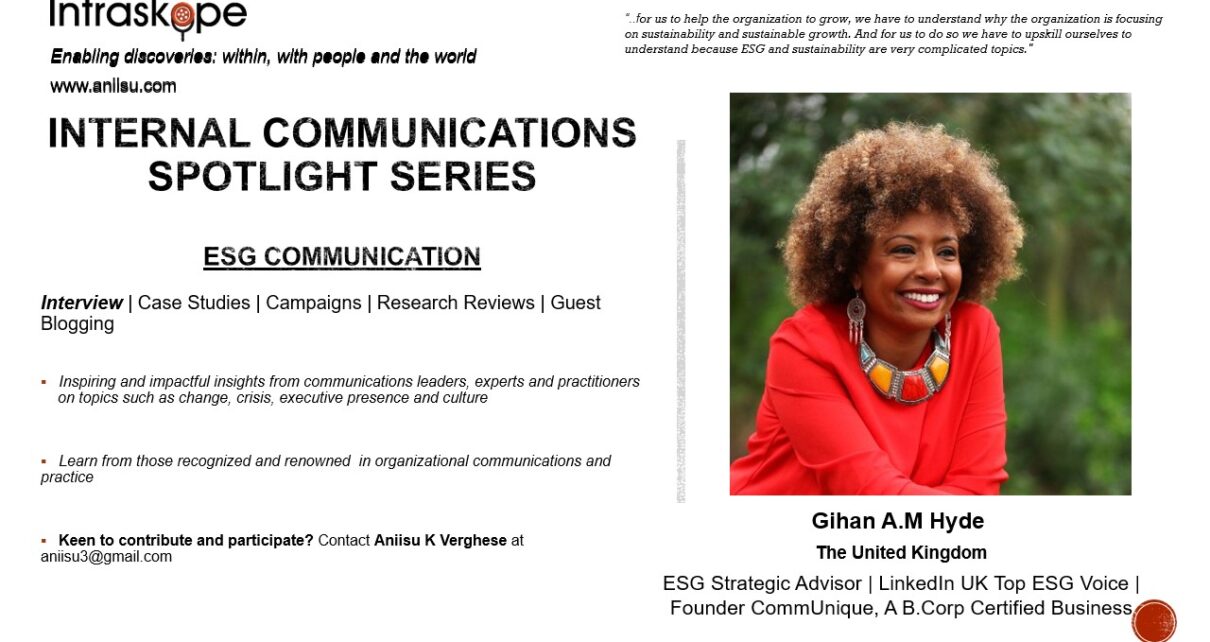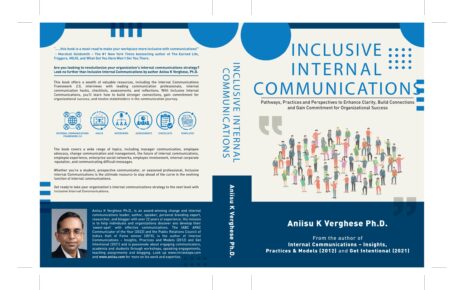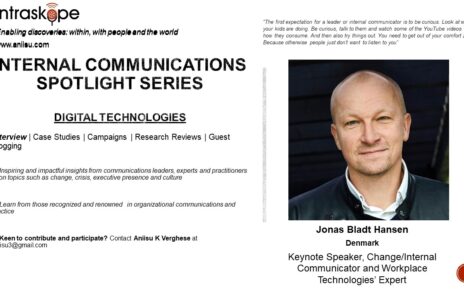Why has Environmental, Social and Governance (ESG) communication gaining in popularity? What prevents organizations from investing in communication that can improve understanding? How can internal communicators do more to help businesses communicate effectively?
With the United Nations Framework Convention on Climate Change Conference of the Parties (COP27) wrapping up a historic agreement recently, the focus on sustainability and ESG has never been stronger.
But, are internal communicators aligned to the need of the hour?
Learn about this topic with a champion ESG strategist, Gihan Hyde in the 32nd edition of Intraskope’s Spotlight Series.
Gihan founded Communique (the first Arab Black Founded Company to B.Corp certified) because she wanted to give a voice to fellow sustainability & communication professionals who are from underdeveloped countries and underrepresented communities. Her team and she offers services to integrate ESG initiatives within the business model, designing and developing ESG communication strategies, auditing the effectiveness of ESG strategies and communication messages and training on
ESG & its Ecosystem
In this chat, Gihan talks passionately about why ESG is coming of age and yet there is a long way to go before people fully comprehend the relevance and value of this important domain.
“We must start thinking critically, we must start challenging and asking questions when we are being given the information from the sustainability teams, because we are the gatekeepers when it comes to employee advocacy. If we don’t understand what we’re communicating, and we’re not verifying what we’re communicating, we are in danger of greenwashing, which is the concept of saying or stating facts as stating facts that are not true”, says Gihan.
Watch this interview with Gihan to learn more.
In the Spotlight on Internal Communications Series, I talk to thought leaders on topics interrelated with internal communications such as culture, crisis, change, executive presence and leadership. The goal is to help unravel why they matter, what can leaders and communicators learn from experts and how we can put insights to practice.
Introduction
My name is Gihan Hyde and my company is called CommUnique. We are a team of nine at the moment and we are from underdeveloped countries and underrepresented communities. What we do is help organizations with three things:
- We integrate sustainability and ESG, which stands for environmental, social and governance initiatives within the organization’s business model.
- The second way we help organization is by communicating ESG and sustainability on behalf of organizations and specifically internally to ensure that their employees are on board with the strategy and they understand what is their role, and,
- Thirdly, not the last or least important, it’s the training sessions. We conduct several training sessions for employees to help them understand what is ESG, what is sustainability and why are they important to play a role in bringing all of these initiatives to life and help grow the business
We are a B Corp-certified organization means that we are one of the most 500 Top most impactful business in the UK and we are the only black Arab female founded organization to get this certification.
1. Why isn’t ESG core to organizational communication?
It depends. For some organizations it is core. For other organizations and specifically those listed on the stock exchange, the law is forcing them to do so. But if you’re a mid-sized to a small sized organization, the law is not there for you yet, and it’s not haunting you yet to report and think about sustainability. There are three reasons why organizations think about sustainability and ESG is the number one reason, they’re being forced by their investors. Number two, they’re being forced by the regulators. And number three, they’re being forced by their customers. Number four – they want to be sustainable. They want to change the purpose and become focused on people on the planet.
2. What is making ESG communications gain attention now?
So, there are four reasons why organizations focus on ESG and people on planet, however, it isn’t core yet. Because there’s no need for them to do so. And that’s why it’s not taking importance in their communications. It is prominent and believe it or not the marketers and the PR professionals are more advanced in that because they have to talk outwards. But from an internal point of view, it hasn’t yet picked up drastically as I would have hoped it would by now.
3. How can internal communicators get more adept with ESG communications?
My recommendations are:
– #1 you need to understand that as internal communicators we must understand it first because we are the voice and ears and eyes of the organization and the people within our organization. So, for us to help the organization to grow, we must understand why the organization is focusing on sustainability and sustainable growth.
– And for us to do so we must upskill ourselves to understand because ESG and sustainability are very complicated topics.
And for us to humanize it and communicate it effectively to change that mindset. We have to upskill ourselves. So that’s the first thing we need to take courses to understand what it is the second thing once we’re upskilled, I would recommend that you use a document called a materiality assessment. And the materiality has just been it’s literally a document that outlines what are the important aspects of sustainability that the organization wants to focus on.
Once we figure out what are the important aspects we then need to weave it into our business-as-usual communications and not treated as a change column or a standalone campaigns because we will not succeed in changing the mindset of our employees.
4. What tips do you have for leaders when it comes to making ESG communications core to the organization?
Leaders will always be thinking about it if they are forced to think about it. Okay, but they will not think about it from a communications point of view. It’s not their skill set. Not only is it for communication and communicators. Our role as internal communicators is to provide the leaders with the data to showcase that it’s important that they are the face of sustainability and the initiative and the strategic direction. And the way we should do that is by getting the data from our employees to figure out how we can push the sustainability mindset from top down and also from the bottom up. For internal communicators think of it as an Uber map. So, if you order a map if you order a car, for example, you could see the car moving. That’s the North Star that we as internal communicators need to focus on. But then as employees we also need to see the car moving. And that’s the whole idea of the Uber car analogy – so you could be delayed for five, six minutes, but at least you can see it coming. So that gives you reassurance that sustainability is integrated within your organization.
5. What kind of profiles will be suitable for the role of ESG communications?
I think the ideal team, not just roles – should include a sustainability Technical Professional, because he or she will be making sense of the complicated data. We may not be aware of all the jargon. But at least they’re giving us something and then when we have them as part of our team we will be able to demystify the technicality behind the work that you’re doing. So, I think one of the members should have a skill set that entails either environmental impact or social impact.
Then we need a data analyst because it’s the data analyst who will help us as internal communication to demystify all the data that’s coming from different directions. For example, if you’re building a GRI report, which stands for the Global Reporting Initiative, that reports requires data. It requires data from HR from, from health and safety, for example, from internal communication, etc. As internal communicators, we need to either have someone who would help us understand this data in a better way, or we work with someone in the sustainability team who is a data scientist.
And the third is about critical thinking. We must start thinking critically, we must start challenging and asking questions when we are being given the information from the sustainability teams, because we are the gatekeepers when it comes to employee advocacy. If we don’t understand what we’re communicating, and we’re not verifying what we’re communicating, we are in danger of greenwashing, which is the concept of saying or stating facts as stating facts that are not true, or they are talking about an initiative that is not true. So, to give you an example of a green washing initiative, there is a cleaner air product, and they claimed that their tops are made from ocean plastic. But when you dig deeper, it’s not plastic from the oceans. It’s made from plastic from the beaches next to the oceans. So that is considered greenwashing because you’re not telling your consumers and your employees the truth. So, we need to think and we need to start questioning every data set and every message that’s coming out from the sustainability team so we can understand.
6. What are some of the best practices you’ve seen with ESG communications from your experience?
We have been consulting and we are sector agnostic. So, we’re not sector specific. And we have so far worked with eight different sectors and the best practice I have personally seen as being transparent about not being perfect, and not getting everything correct. And asking for help from your employees to help you figure out how to rectify and how to ensure that your facts and your initiatives are truly impactful and truthful. Transparency, honesty, consistency, clarity and humanization are key.
Watch the complete video interview on YouTube or read the complete transcript above.
Missed the earlier episodes? Watch them here: D. Mark Schumann (Culture), Peter Yorke (Executive Presence), Sia Papageorgiou (Leadership Communications), Dianne Chase (Strategic Storytelling), Gloria Walker (Communication Planning), Rebecca Sangster-Kelly (Stakeholder Management), Ray Walsh (Localizing Employee Communications), Prof. Matt Tidwell (Reputation), Geri Rhoades (Manager Communications), Erik K Meyers (Business Acumen), Russell-Olivia Brooklands (IC Practice Governance), Paul Barton (Public Speaking and Business Communication), Cyrus Mavalwala (Digital Communication), Elvera N Makki (Social Impact Communication), Philippe Borremans (Communication Preparedness), Magdalena Petryniak (Influence in Communications), Priya Bates (Communicating Diversity & Inclusion), Zora Artis (Communication Alignment), Diana Bonczar (Communication Execution), Jane McConnell (Gig Mindset), Paul Mathews (Trust & Communications), Brad Whitworth (Creativity in Communication), Zane Ewton (Podcasting), Andrea Greenhous (Employee Experience) and Jonas Bladt Hansen (Digital Technologies), Luis Suarez (Data Analytics & KM) , Laura McHale (Neuroscience in Communications),, Christopher Flores (Internal Communication Hiring) Chaya Mistry ( Human Leadership), Jenni Field (Organizational Productivity) and Mike Klein (Communication Innovation).
You can also look up the ongoing Intraskope’s Spotlight on Internal Communication Series featuring practitioners from around the globe sharing best practices and perspectives.
Liked the interview? Post your comments and share it with your network.
Keen to participate in the ongoing series on Personal Branding, Crisis Communications, Internal Communications or CSR Communications? Drop me a note at [email protected]
Here are Internal Communications resources you can use:
- Learn: Internal Communications Fundamentals Course on Thinkific
- Internal Communications Series: https://forms.gle/KcqmPzLwq7NQi5Km6
- Chat with Aniisu – Internal Communications: https://www.instamojo.com/intraskope/connect-with-aniisu-60-minute-personalized-d/?ref=store
- Internal Communications workshops: https://bit.ly/2zdBRl1
You can also visit my website www.intraskope.com and YouTube channel to know more about my work.
#IC #ESG #ESGcommunication #internalcomms #data #GRI #commsanalytics #GRIReporting #sustainability #environmental #social #governance #messaging #leadership #management #communication #internalcomms #communications #internalcommunications #covid19 #GihanHyde #ESGStrategy #ESGskills #ESGgoals #UNSDG #greenwashing #sportswashing #communicationgoals #ICgoals #responsiblecommunication #competentcommunicator #climatechange #engagementscores #globalclimate #climate #commitment



